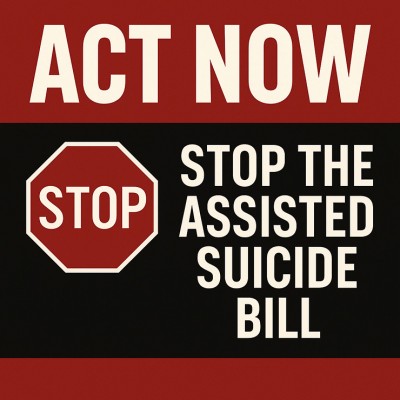
Monday night, the State Senate gave final legislative approval to a bill that could make New York the 12th state to approve a statute that supporters call “medical aid in dying” and opponents call “physician-assisted suicide.”
In an alarming turn that has reverberated across the Orthodox Jewish community and beyond, the New York State Senate has joined the Assembly in passing the “Medical Aid in Dying Act” (S.138/A.136), a bill that would permit doctors to prescribe lethal medication to mentally competent, terminally ill adults. This is not the first time the Legislature has flirted with legalizing assisted suicide, but after a decade of relentless attempts—introduced as A10059 in 2015, then reintroduced every session since—this marks a dangerous and unprecedented advance. The Assembly’s 81–67 vote in April was followed on Monday night, June 9, 2025, by a narrow 35–27 Senate approval, leaving only the Governor’s signature standing between New Yorkers and state-sanctioned suicide.
Why is this happening now, after so many years of failed attempts? Despite fierce opposition, proponents have steadily chipped away at safeguards and public resistance. This latest version shortens waiting periods, fails to require comprehensive psychological evaluation, and even allows death certificates to mask the true cause of death. The pressure from powerful advocacy groups, shifting public sentiment, and a relentless legislative campaign have pushed the bill further than ever before. The Senate’s vote has stunned and saddened our community, which has long stood as a voice of conscience on life and death.
Torah Jews know that pikuach nefesh—the obligation to protect life—sits at the pinnacle of our value system. The Torah’s imperative, “You shall surely guard your lives” (Devarim 4:15), is not a platitude, but a binding commandment. Every human being is created b’tzelem Elokim, in the Divine image, and every moment of life possesses immeasurable value. “Allowing physicians to become accomplices to suicide,” wrote Rabbi David Zwiebel, Executive Vice President of Agudath Israel, “is a profound moral and practical misstep.” Rabbi Yeruchim Silber, Agudah’s Director of New York Government Affairs, pointed out, “We have testified, testified again, sent action alerts … we strongly urge Governor Hochul to veto this bill.”
From the pulpit to the hospital room, the chorus of opposition has been broad and deep. Agudath Israel, through its Chayim Aruchim division, has provided 24/7 halachic guidance and patient advocacy for families navigating end-of-life dilemmas. They bear witness to the truth that medical prognoses are not divine decrees—countless patients outlive their “six months to live” predictions and return to life’s joys. Even when doctors say the case is hopeless, as with Miriam from Kew Gardens Hills—who lived to dance at her great-granddaughter’s wedding—life can surprise us. David, whose presence each Shabbos at the synagogue Kiddush helps prep and uplift friends and acquaintances, embodies how every moment preserved is a moment of meaning.
Secular voices have joined in protest. The Patients Rights Action Fund and the National Council on Disability have documented abuses in other states, including cases where insurance denied life-saving care but offered lethal drugs, and where disability-related fears—not pain—drove suicide requests. The American Medical Association has reaffirmed that physician-assisted suicide is fundamentally incompatible with the healer’s role.
The Jewish perspective is clear: we are charged to alleviate suffering, to provide comfort, and to ensure dignity, but never to abandon the ill or the frail to despair. Halachah allows for palliative care, hospice, and DNR orders under rabbinic guidance. We encourage every family to fill out halachic health care proxies and directives, naming a rabbi and trusted agent to ensure all decisions are made according to Torah law.
Notably, opposition to this bill has united Orthodox, Modern Orthodox, and even Conservative rabbinical organizations. The Vaad Harabbonim of Queens, Rabbinical Alliance of America, Agudath Israel, and Chayim Aruchim have all spoken out. Even the Conservative Rabbinical Assembly, in a 1997 ruling, rejected assisted suicide, underscoring the fundamental Jewish commitment to life.
A Community’s Pain and a Plea for Mercy
The passage of this bill has created profound pain and confusion among our Orthodox and Modern Orthodox neighbors throughout Queens and beyond. Many are deeply troubled that leaders, including trusted friends in government who have stood by our kehillah, have now taken positions so at odds with our most cherished values. We are left bewildered—how can those who know the meaning of pikuach nefesh, who have addressed us in synagogues about the importance of life, now support a policy that so clearly contradicts the teachings of Torah and the conscience of our community?
Yet, even in our distress, we remain respectful and hopeful. We humbly and earnestly request clarity and transparency from our representatives, believing that open conversation is the bedrock of a true partnership. We are not interested in public shaming or divisiveness; rather, we seek understanding, accountability, and a return to the values that have united us for generations.
But now, all eyes turn to Albany—and most of all, to Governor Kathy Hochul.
New York At The Edge: A Torah Stand Against Assisted Suicide
Typography
- Smaller Small Medium Big Bigger
- Default Helvetica Segoe Georgia Times
- Reading Mode




